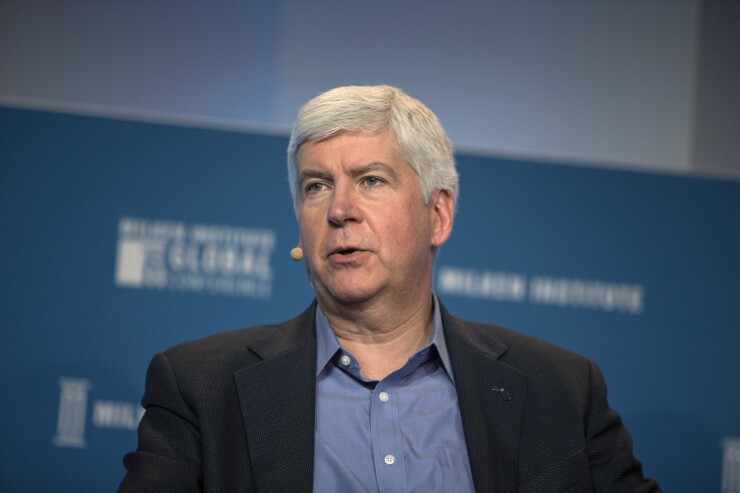Michigan legislators approved a $56.8 billion spending plan for fiscal year 2019. The spending plan for the year that begins Oct. 1 will see the state allocating more to schools, roads and infrastructure.
The two main budget bills won approval on mostly party-line 63-46 and 66-43 votes in the House and 33-2 and 25-11 votes in the Senate. They head to Gov. Rick Snyder, who is expected to sign by the end of June.

“Gov. Snyder is appreciative of the hard work done by his legislative partners in delivering another balanced budget months ahead of schedule, with key investments in talent development, road improvements and a new deposit in the state's Rainy Day Fund,” governor's spokeswoman Anna Heaton said in an emailed statement.
There are "great investments, but we're also being very responsible with the investment of the hard-working taxpayer dollars," said Senate Appropriations Committee Chairman Dave Hildenbrand, R-Lowell. "It's a reduction in spending over the current year. Because of the strengthening of the economy, more people are working and there is less demand on social welfare services."
House Democratic Leader Sam Singh, D-East Lansing, was critical.
“The hardworking people of Michigan deserve a budget that works just as hard for them. Instead, the budget passed by the state Legislature today is a half-hearted election-year stunt that attempts to look good while doing little to move the needle on what really matters to working families," he said. "The School Omnibus budget threatens to close struggling schools that can’t meet herculean goals or fire a quarter of their staff, while the General Omnibus budget still fails to take the problem of our failing infrastructure seriously."
The budget comes as the state reaped in an extra $500 million in revenue surplus that was largely due to an increase in collected taxes. The one-time increase will be spent on fixing the state’s roads but the state will also see increased spending on school safety and boosting the state’s rainy day fund and Michigan’s Marshall Plan for Talent.
Michigan will spend an extra $300 million on roads and infrastructure on top the roughly $1 billion the state had already planned to spend over the course of the next year. The state increase in spending is part of the Snyder’s administration road funding 2015 deal that hiked fuel taxes and registration fees and calls for gradually stepped-up road funding from the state's general fund.
“Our roads, bridges and infrastructure are critical to the vitality of our state and our economy,” said Sen. Majority Leader Arlan Meekhof, R-West Olive.
Democrats said local governments are bearing the brunt of bad budgeting.
“We cannot keep shifting more programs and costs onto our local units of government," said Rep. Sara Cambensy, D-Marquette. "It’s a double whammy, and that’s why our communities are continually asking taxpayers for help with bonds and millages, because Lansing continues to starve them from the revenue they were promised.”
The budget gives Michigan schools the largest per pupil funding increase in years with up to an additional $240 per student, depending on the district, at a cost of $312 million.
“To marginally increase funding every year after drastic reductions, since they’ve come into power, and then try to convince us we should be grateful for it, does nothing for the progress of our students,” said Rep. Sherry Gay-Dagnogo, D-Detroit.
Public universities will see a 2% funding increase, or $28.6 million, with the increase coming from the School Aid Fund. Increases for individual universities are expected to range from 1.5% to 3.1%, with penalties for those who exceed tuition restraints or fail to comply with measures to address campus sexual assault. The tuition restraint is 3.8% or $490, whichever is greater.
The budget also beefs up the state’s rainy day fund to more than $1 billion. It stood at about $2 million when Snyder took office in 2011.
Snyder has said that the state needs to set aside more to build up reserves. The Citizens Research Council, a not-for-profit public affairs research organization, has said that the rainy day fund won’t last long if a recession of any severity strikes.
S&P Global Ratings rates Michigan AA-minus with a positive outlook. Moody’s Investors Service rates Michigan’s GO bonds Aa1 and Fitch Ratings rates the bonds AA, Both with stable outlooks.





